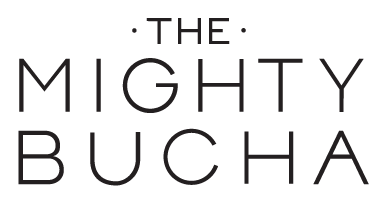FAQs
So Kombucha is alive, is it really safe?
Absolutely! Probiotic bacteria is incredibly important for your physical health and mental well-being. New research is coming out all the time that is linking gut health to a wide range of diverse conditions: including poor immune health [1], lowered energy levels and depression [2]. The Mighty Bucha is brewed in a safe environment and has been tested to show that it is free from all dangerous bacteria.
How much can I drink?
You can drink up to 250ml a day. Kombucha is a powerful source of probiotic bacteria so, if you're body isn't used to fermented foods, you can always drink a little bit at a time until you get used to it.
How long does it keep for?
The Mighty Bucha has been tested and has a proven shelf-life of six months. Once opened it can be refrigerated and drunk within three days.
Is The Mighty Bucha free from allergens?
It is! The Mighty Bucha is free from gluten, dairy, sulphites and nuts - as well as being brewed in an area where no nuts are handled. It's also raw, Vegan and Paleo-friendly!
Is it non-alcoholic?
It is! We have rigorously tested The Mighty Bucha and we can safely say that all our Kombucha is non-alcoholic.
Is it suitable for people who are pregnant or breastfeeding?
Because The Mighty Bucha contains live probiotic bacteria we would always recommend talking to your doctor before drinking. It is, after all, a time to be extra careful!
How much caffeine is in the green coffee brew?
The green coffee Kombucha contains 34.9mg of caffeine per 100ml. Brewed coffee contains approximately approximately 30 - 64mg of caffeine per 100ml, so it has about as much caffeine as a fairly weak cup of coffee.
Many people have reported that they find the effects of green coffee to be much milder than that of black beans but, ultimately, If you're worried about caffeine intake then why not try the Ginkgo, Ginseng and Sarsaparilla brew instead!
I suffer from candida overgrowth, does the Mighty Bucha contain yeast?
It does! However it doesn't contain the yeast that causes inflammatory reactions (Candida albicans). There is also evidence that Kombuhca suppresses yeast and bacteria colonisation [3] [4], making it potentially beneficial for those suffering from Candida overgrowth!
Kombucha cultures from across the world have been tested and while they all contain diverse strains of yeast - including Candida strains - it does not contain anything associated with infections [5]. If you're worried about it don't drink it! Or you can always try a little bit and see how your body reacts.
Some stuff has appeared in my drink, what is it?
Because the drink is alive fresh cultures can form in the bottle. It's a sign that your drink is both vigorous and healthy! They're fine to drink, although we'll forgive you if you don't :)
Do you have a bottle return policy?
Not yet - but we're working on it. We'll let you know when we're ready!
Citations
[1] Ho, J., Chan, G. and Li, J. (2015). Systemic effects of gut microbiota and its relationship with disease and modulation. BMC Immunology, [online] 16(1). Available at: https://bmcimmunol.biomedcentral.com/track/pdf/10.1186/s12865-015-0083-2.
[2] Foster, J. and McVey Neufeld, K. (2013). Gut–brain axis: how the microbiome influences anxiety and depression. Trends in Neurosciences, [online] 36(5), pp.305-312. Available at: https://www.sciencedirect.com/science/article/pii/S0166223613000088.
[3[ Barbancik, G.F., Cainii grib i ego lecebnye svoistva (The tea fungus and its therepeutic propoerties): 54pp, Omskoe oblastnoe kniznoe izdatelstvo, 1958
[4[ Konovalov, I.N., Litinov, M.A. & Zakman, L.M., "Izmenenie prirody i fiziologiceskii osobennostei cainogo griba medusomyces gisevii lindau v zavisimosti ot uslovii kultiviromania" (Changes in the nature and psyliological properties of the tea fungus medusomyces gisevii lindau regarding the requirements of the culture medium): Bot Zurnal, vol.44, no.3, pp.346-9, Moscow 1959.
[5[ Jayabalan, R., Malbaša, R., Lončar, E., Vitas, J. and Sathishkumar, M. (2014). A Review on Kombucha Tea-Microbiology, Composition, Fermentation, Beneficial Effects, Toxicity, and Tea Fungus. Comprehensive Reviews in Food Science and Food Safety, [online] 13(4), pp.538-550. Available at: https://onlinelibrary.wiley.com/doi/full/10.1111/1541-4337.12073.

